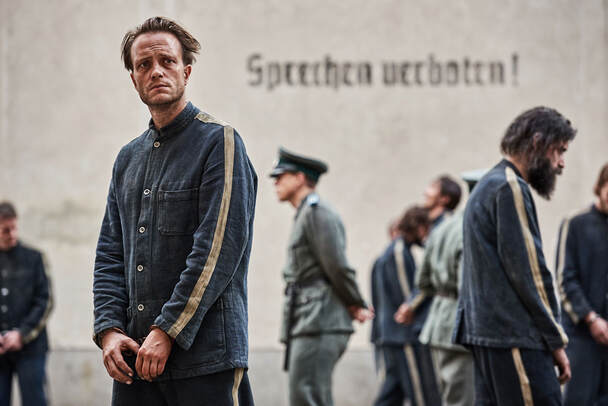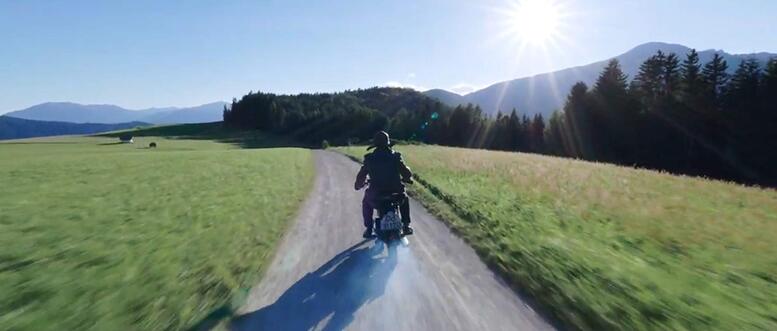A HIDDEN LIFE
*****
Director: Terrence Malick
Screenwriter: Terrence Malick
Principal cast:
August Diehl
Valerie Pachner
Karin Neuhäuser
Tobias Moretti
Matthias Schoenaerts
Bruno Ganz
Country: Germany/USA
Classification: PG
Runtime: 174 mins.
Australian release date: 30 January 2020.
According to Terrence Malick, his methodology is, “I film quite a bit of footage, then edit. Changes before your eyes, things you can do and things you can’t. My attitude is always let it keep rolling…” And so he does in his latest film, A Hidden Life, a sprawling, glorious epic based on true events that took place in Austria during World War II after the German annexation of the country. It opens using archival footage, shot in classic 4:3 ratio, of the Nazis’ arrival in Austria, incongruously heralded by the most beautiful choral music. The following frames, in wide-screen, take us to the high mountains and the most serene, peaceful countryside, in sharp contrast to the images which preceded them. This disparity is ominous because, at this stage, it’s impossible to know why Malick has brought these contrasting pictures into conjunction, but we understand that there’s a reason for it and it’s probably not an agreeable one.
In the village of St. Radegund, we are introduced to the simple life of a peasant farmer, Franz Jägerstätter (August Diehl), his adoring wife Fani (Valerie Pachner) and their three happy young daughters. This is an ancient hamlet where life is controlled by the weather and the seasons and things are done the way they always have been. Communal life is centred on the crops and the church until, that is, the Nazis start calling on the men of the town to go and fight, but Franz doggedly goes about his business, trying to ignore the increasingly nationalistic talk he hears at the pub. Only to Fani and the local priest, Father Fürthauer (Tobias Moretti), does he express his horror, asking “What’s happened to our country, to the land we love?” and “Don’t they know evil when they see it?” Eventually, though, he is called up for military training but, despite the fact that he refuses to swear the compulsory oath of allegiance to Hitler, he is sent home because farmers are exempt from active service. In 1943, however, Franz is conscripted once more, only this time his conscientious objection is considered highly treacherous by the Nazis because it ‘undermines military morale’ and his defiance has shocking consequences.
A Hidden Life is an extraordinary achievement and Malick openly wears his heart on his sleeve in his emotional screenplay. This is a cry against fascism and repression, one that grapples with the director’s perennially favourite themes of faith and philosophy. His characters, speaking at various times both German-Austrian and English, talk in short, almost declamatory aphorisms but somehow it works. They say things like, “We all have blood on our hands, no-one is innocent”, “The sun shines on good and evil the same” and “Better to suffer injustice than to do it,” so it’s plain to see the issues that Malick is tackling. The bewilderment and confusion that Franz and Fani go through as they are confronted by the enormity of the life-and-death decision they must make are wonderfully portrayed by Diehl and Pachner and it’s impossible not to be profoundly moved by their subtle, nuanced performances. James Newton Howard’s stunning, spare score manages to highlight both the loving couple’s pastoral idyll and the hideous dilemma they face and Jörg Widmer’s swirling camera takes your breath away as it magnificently records the sheer beauty of the terrain surrounding St. Radegund, a beauty that belies the horror of the events underlying the tragic story. This is, after all, a film of contrasts.
At just under three hours in length, A Hidden Life is not a film for everyone; if you’re addicted to your iPhone, don’t go. This is a work of great depth and subtlety, a love story that deals with serious matters about how we choose to live our lives and the importance of the decisions we must take when confronted by ignorance and evil. It may be looking back at past events but it’s still extremely relevant today. It’s close to a masterpiece.
Screenwriter: Terrence Malick
Principal cast:
August Diehl
Valerie Pachner
Karin Neuhäuser
Tobias Moretti
Matthias Schoenaerts
Bruno Ganz
Country: Germany/USA
Classification: PG
Runtime: 174 mins.
Australian release date: 30 January 2020.
According to Terrence Malick, his methodology is, “I film quite a bit of footage, then edit. Changes before your eyes, things you can do and things you can’t. My attitude is always let it keep rolling…” And so he does in his latest film, A Hidden Life, a sprawling, glorious epic based on true events that took place in Austria during World War II after the German annexation of the country. It opens using archival footage, shot in classic 4:3 ratio, of the Nazis’ arrival in Austria, incongruously heralded by the most beautiful choral music. The following frames, in wide-screen, take us to the high mountains and the most serene, peaceful countryside, in sharp contrast to the images which preceded them. This disparity is ominous because, at this stage, it’s impossible to know why Malick has brought these contrasting pictures into conjunction, but we understand that there’s a reason for it and it’s probably not an agreeable one.
In the village of St. Radegund, we are introduced to the simple life of a peasant farmer, Franz Jägerstätter (August Diehl), his adoring wife Fani (Valerie Pachner) and their three happy young daughters. This is an ancient hamlet where life is controlled by the weather and the seasons and things are done the way they always have been. Communal life is centred on the crops and the church until, that is, the Nazis start calling on the men of the town to go and fight, but Franz doggedly goes about his business, trying to ignore the increasingly nationalistic talk he hears at the pub. Only to Fani and the local priest, Father Fürthauer (Tobias Moretti), does he express his horror, asking “What’s happened to our country, to the land we love?” and “Don’t they know evil when they see it?” Eventually, though, he is called up for military training but, despite the fact that he refuses to swear the compulsory oath of allegiance to Hitler, he is sent home because farmers are exempt from active service. In 1943, however, Franz is conscripted once more, only this time his conscientious objection is considered highly treacherous by the Nazis because it ‘undermines military morale’ and his defiance has shocking consequences.
A Hidden Life is an extraordinary achievement and Malick openly wears his heart on his sleeve in his emotional screenplay. This is a cry against fascism and repression, one that grapples with the director’s perennially favourite themes of faith and philosophy. His characters, speaking at various times both German-Austrian and English, talk in short, almost declamatory aphorisms but somehow it works. They say things like, “We all have blood on our hands, no-one is innocent”, “The sun shines on good and evil the same” and “Better to suffer injustice than to do it,” so it’s plain to see the issues that Malick is tackling. The bewilderment and confusion that Franz and Fani go through as they are confronted by the enormity of the life-and-death decision they must make are wonderfully portrayed by Diehl and Pachner and it’s impossible not to be profoundly moved by their subtle, nuanced performances. James Newton Howard’s stunning, spare score manages to highlight both the loving couple’s pastoral idyll and the hideous dilemma they face and Jörg Widmer’s swirling camera takes your breath away as it magnificently records the sheer beauty of the terrain surrounding St. Radegund, a beauty that belies the horror of the events underlying the tragic story. This is, after all, a film of contrasts.
At just under three hours in length, A Hidden Life is not a film for everyone; if you’re addicted to your iPhone, don’t go. This is a work of great depth and subtlety, a love story that deals with serious matters about how we choose to live our lives and the importance of the decisions we must take when confronted by ignorance and evil. It may be looking back at past events but it’s still extremely relevant today. It’s close to a masterpiece.

